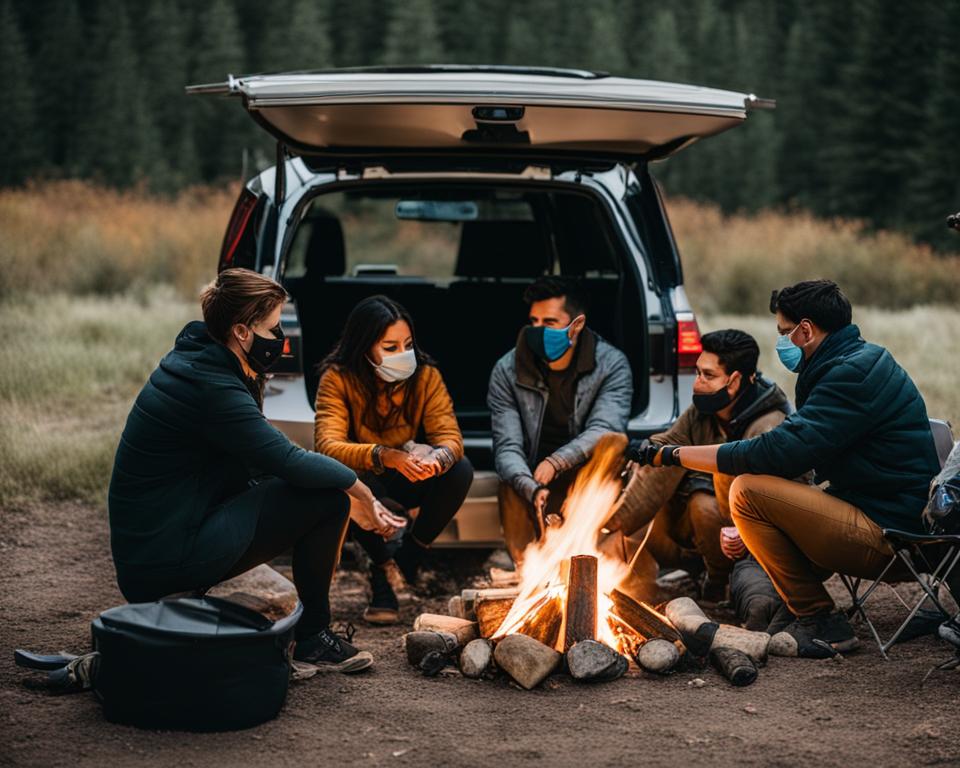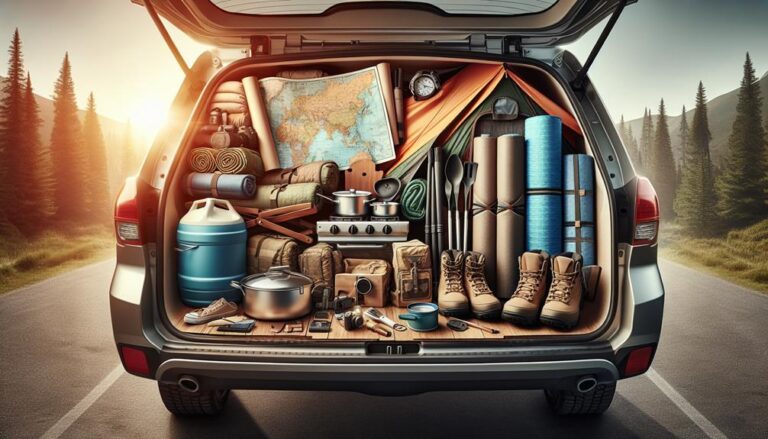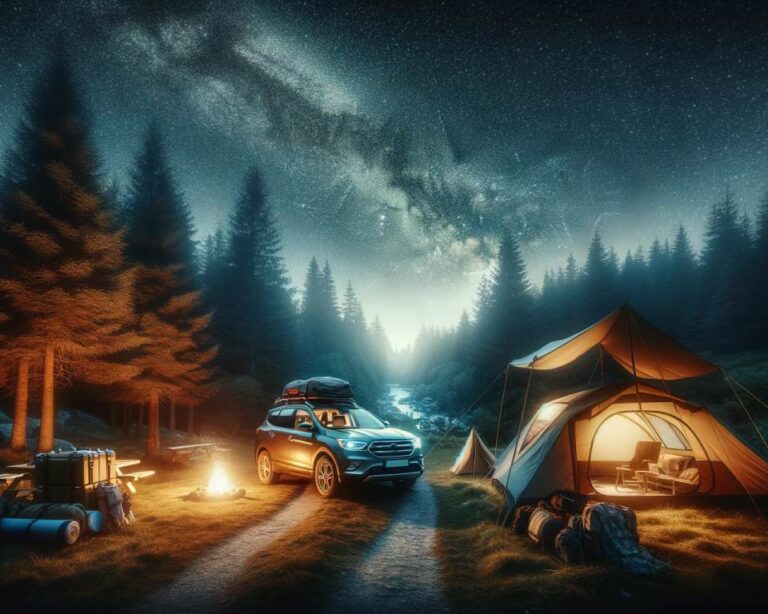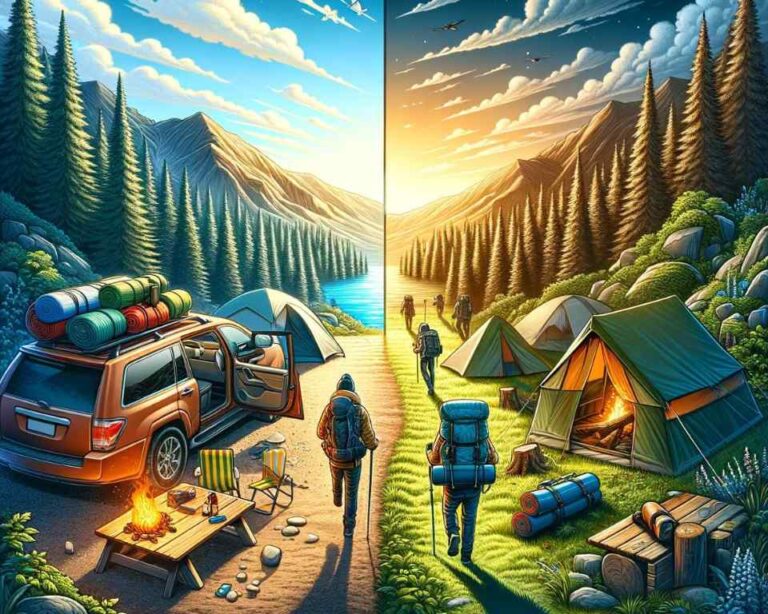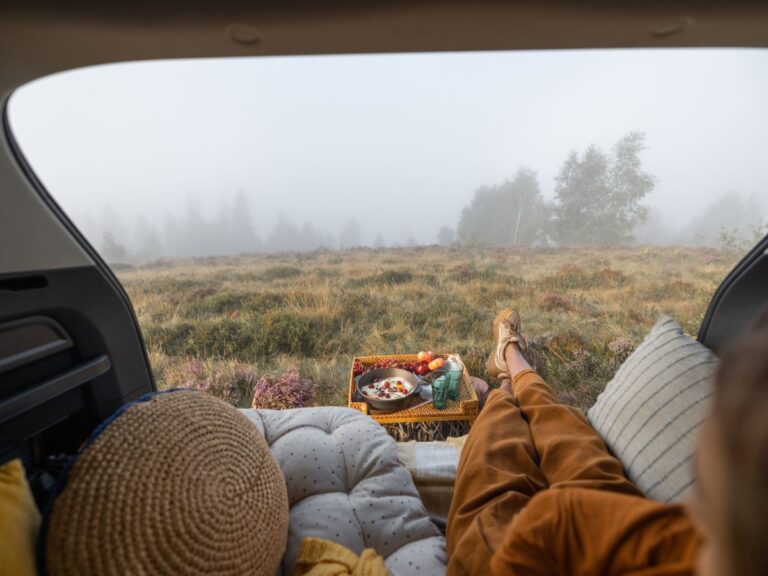Car Camping in the Era of COVID-19: Adapting to New Health Protocols
The COVID-19 pandemic has brought about significant changes in our daily lives, including how we enjoy outdoor activities like camping. As restrictions and guidelines continue to evolve, it is important for us to adapt our camping practices to ensure the safety of ourselves and others.
Car camping has become increasingly popular during these uncertain times because it allows for social distancing and greater control over our environment. By camping in our own vehicles, we can have the freedom to explore nature while adhering to the necessary health protocols.
Safe camping practices should be our top priority during the pandemic. It is important to follow camping guidelines, maintain proper social distancing, and practice good hygiene. We must also be aware of any camping restrictions or rules set by national parks or campgrounds, as they may vary depending on the location.
By being responsible campers, we can continue to enjoy the beauty and tranquility of nature while prioritizing the safety of ourselves and others. In the following sections, we will explore the appeal of car camping in the current climate, considerations for camping during COVID-19, and practical tips for a safe and enjoyable camping experience.
The Appeal of Car Camping in the Current Climate
Car camping has become increasingly popular in recent years, and the COVID-19 pandemic has only strengthened this trend. During these uncertain times, car camping offers a unique appeal that satisfies our desire for adventure while adhering to social distancing guidelines. The great outdoors provides a refreshing change of scenery, allowing us to escape from our daily lives and reconnect with nature.
One of the key advantages of car camping during the COVID-19 pandemic is the lower risk associated with outdoor spaces. Public health experts have consistently emphasized that spending time in open-air settings reduces the risk of COVID-19 transmission compared to indoor environments. This knowledge has prompted many people to embrace camping as a safer way to travel and explore, minimizing exposure to crowded areas.
“In nature, I find solace and peace. Car camping allows me to immerse myself in the beauty of the outdoors while keeping a safe distance from others. It’s a perfect escape from the stresses of daily life, especially during these challenging times.”
Moreover, the increased interest in camping activities signifies a growing appreciation for the simplicity and authenticity that nature provides. Car camping offers an abundance of outdoor adventures, such as hiking, fishing, and stargazing, which bring us closer to the natural world. It allows us to disconnect from technology and connect with loved ones and ourselves. In a time when our routines have been disrupted, camping serves as a reminder of the joys and wonders that exist beyond our daily obligations.
Considerations for Camping during COVID-19
When planning a car camping trip during the COVID-19 pandemic, there are important considerations to keep in mind to ensure safety and minimize the risk of transmission. Following health guidelines and practicing responsible camping practices are crucial elements for a safe and enjoyable camping experience.
To prioritize safety, it is essential to adhere to health guidelines recommended by authorities. This includes practicing good hygiene by washing hands frequently with soap and water for at least 20 seconds or using hand sanitizers with at least 60% alcohol content. Maintaining social distancing of at least 6 feet from individuals outside your household is also crucial to minimize the risk of transmission.
“By following health guidelines and practicing responsible camping practices, we can ensure a safe and enjoyable camping experience during the COVID-19 pandemic.”
When selecting campsites, be mindful of any camping restrictions or guidelines set by national parks or campgrounds. Some areas may have capacity limits or specific rules regarding campsite reservations or usage. By being aware of and adhering to these guidelines, we can contribute to maintaining a safe camping environment for everyone.
Responsible camping practices are not only beneficial for our own safety but also for the preservation of the environment and the well-being of fellow campers. It is important to respect nature by leaving no trace. This includes properly disposing of trash, minimizing noise pollution, and staying on designated trails. By minimizing our impact on the environment, we can continue to enjoy the beauty of nature for years to come.
Choosing a Campsite and Preparing for Your Trip
When it comes to selecting a campsite during the COVID-19 pandemic, there are specific considerations to keep in mind. Prioritizing privacy and hygiene is crucial to ensure the safety of yourself and others. Opting for private camping options, such as secluded campsites or tiny cabin rentals, can provide a higher level of control and minimize interactions with other campers.
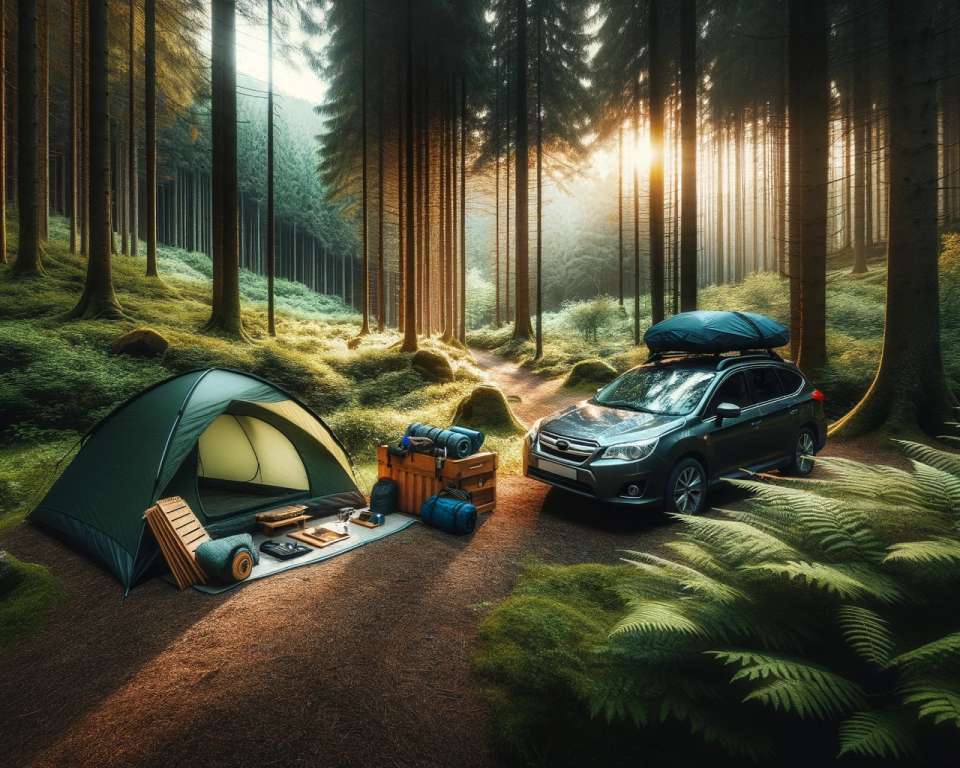
Look for campsites that offer amenities designed to promote hygiene and cleanliness. Facilities for regular handwashing or sanitizer stations are essential to maintain proper hygiene during your trip. These amenities not only offer convenience but also contribute to a safer camping experience for everyone.
When packing for your COVID-safe camping trip, remember to include essential items that prioritize hygiene. Hand sanitizers, disinfecting wipes, and face masks are must-haves to keep you and your fellow campers protected. Be prepared with these items to maintain a high standard of cleanliness throughout your camping adventure.
- Private camping options provide more control and minimize interactions with others.
- Look for campsites with facilities for handwashing or sanitizer stations.
- Pack essential items like hand sanitizers, disinfecting wipes, and face masks for hygiene.
By choosing a campsite that prioritizes privacy and amenities for hygiene, and packing the necessary essentials, you can ensure a safe and enjoyable camping trip during these uncertain times.
Campsite Etiquette and Social Distancing
In the current climate, it is crucial to prioritize campsite etiquette that promotes social distancing and respect for the space of others. By following these guidelines, we can ensure the safety and well-being of the camping community as a whole.
1. Maintain a Safe Distance
When setting up your campsite, be mindful of the space between neighboring campsites. It is important to maintain a safe distance to minimize close contact and promote social distancing. Respecting the personal space of others is essential in reducing the risk of COVID-19 transmission.
2. Avoid Crowded Areas
During your camping trip, be conscious of areas that may become crowded, such as communal facilities or popular attractions. If a particular area seems congested, consider exploring alternatives or adjusting your schedule to avoid peak times. This way, you can ensure a safer and more comfortable experience for yourself and others.
“Respecting the personal space of others is essential in reducing the risk of COVID-19 transmission.”
3. Follow Guidelines and Restrictions
Stay informed about any guidelines or restrictions set by the campground or national park you are visiting. This may include rules regarding gatherings, group activities, or specific areas that are temporarily closed. Adhering to these guidelines helps maintain a safe and healthy environment for everyone.
4. Be Mindful of Others
Remember that we are all in this together, and it is important to be considerate of others. Be conscious of noise levels, especially during quiet hours, to ensure a peaceful and enjoyable experience for everyone. Respecting the camping community fosters a positive atmosphere and encourages others to follow social distancing guidelines.
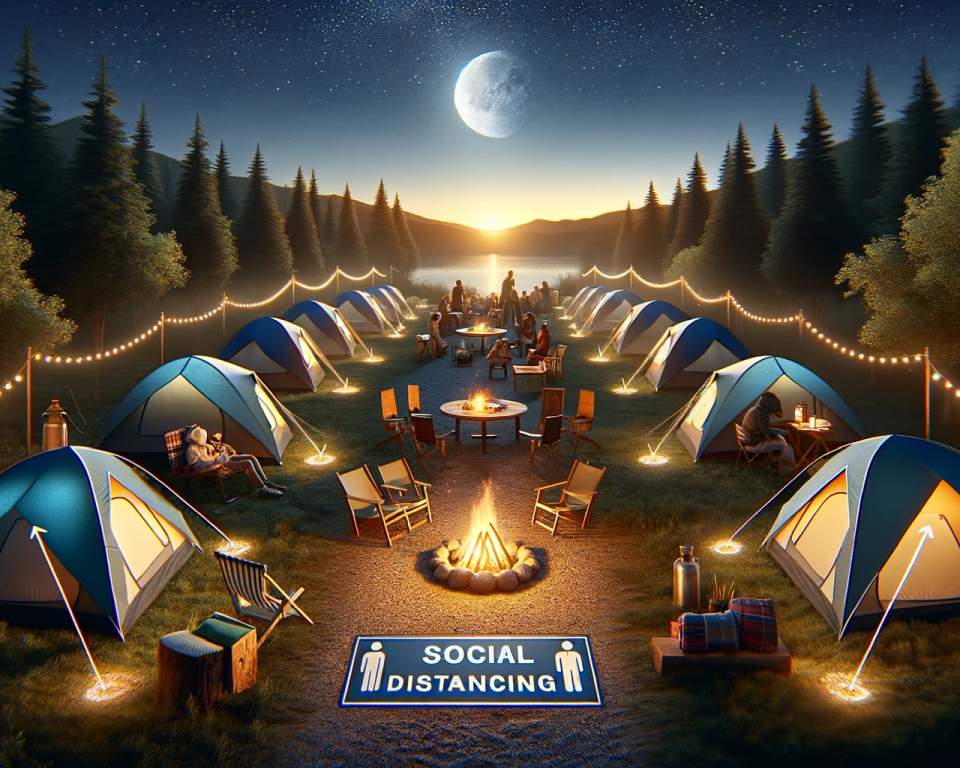
5. Embrace the Outdoors Responsibly
Camping is a wonderful opportunity to connect with nature, but it is essential to do so responsibly. Leave no trace by properly disposing of trash, minimizing your impact on the environment, and respecting wildlife. By being responsible campers, we can ensure the preservation of natural spaces for future generations.
Adhering to campsite etiquette and practicing social distancing allows us to enjoy the beauty of nature while minimizing the risk of COVID-19 transmission. Let’s continue to prioritize the safety and well-being of ourselves and others as we embark on our camping adventures.
Safety Measures for Shared Facilities and Amenities
When camping at campgrounds with shared facilities and amenities, we must prioritize the safety of ourselves and others. Campgrounds should have rigorous cleaning protocols in place for bathrooms and shower facilities, ensuring that they are regularly sanitized to prevent the spread of any germs or viruses. By maintaining a clean and hygienic environment, we can all enjoy these shared facilities with peace of mind.
It is crucial for campers to follow any guidelines or restrictions set by the campground regarding the use of these facilities. These guidelines may include limited capacity, designated usage times, or additional sanitization measures. By respecting these rules, we can help ensure a safe and comfortable experience for everyone.
In common areas such as picnic areas or recreational spaces, it is important to practice social distancing and avoid overcrowding. This allows us to manage and minimize close contact with others while still enjoying the amenities provided. By maintaining proper distance and following any designated guidelines, we can all contribute to a safe camping environment.
By following these safety measures, we can enjoy the shared facilities and amenities offered at campgrounds while reducing the risk of transmission. Let’s all do our part to prioritize safety and ensure a memorable camping experience for everyone.
Food and Cooking Safety Tips
Proper food and cooking safety measures are essential for ensuring a safe and enjoyable camping experience. When it comes to food safety during camping, we must take necessary precautions to minimize health risks.
Handwashing: Before preparing and handling food, always remember to wash your hands thoroughly with soap and water for at least 20 seconds. This simple step helps prevent the spread of bacteria and other contaminants.
Separate Utensils and Containers: To prevent cross-contamination, it is important to use separate utensils and containers for raw and cooked foods. This reduces the risk of spreading harmful bacteria from raw meats to other foods.
Campfire Cooking Tips: When cooking over a campfire, it is crucial to follow safe cooking practices. Ensure that food is cooked thoroughly to kill any bacteria. Use a food thermometer to check the internal temperature of meats to ensure they reach the appropriate level of doneness.
Minimizing Shared Food and Containers: To reduce the risk of transmission, it is advisable to minimize shared food and containers. Instead, opt for individual servings or use separate containers for each person. This helps limit contact and potential contamination.
“Proper food handling and cooking practices are essential for a safe camping experience. By following these food and cooking safety tips, we can minimize health risks and enjoy delicious meals in the great outdoors.”
Remember, food safety during camping is crucial for minimizing health risks. By practicing safe food handling, using separate utensils and containers, following campfire cooking tips, and minimizing shared food and containers, we can ensure a safe and enjoyable culinary experience during our camping adventures.
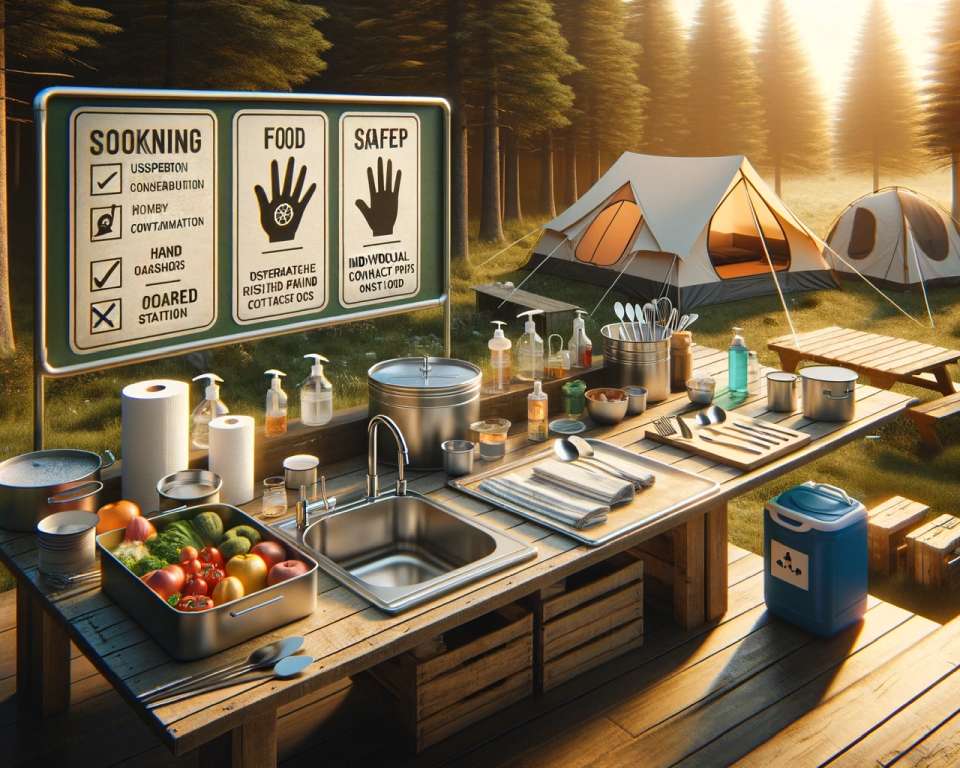
Responsible Waste Management
Responsible waste management is crucial when embarking on camping trips, especially to minimize the environmental impact and maintain cleanliness. At our campsite, we prioritize the principles of “Leave No Trace” to ensure that we leave nature undisturbed and preserve its beauty. One of the main aspects of responsible waste management is packing out all trash and disposing of waste properly. We believe in taking our garbage with us and disposing of it in designated bins or facilities. By doing so, we minimize the risk of littering and maintain the cleanliness of the campsite.
When it comes to campfires, we ensure that they are properly extinguished before leaving the campsite. This not only reduces the chances of accidental fires but also prevents any negative impact on the environment. Disposing of waste in designated bins helps in efficient waste management and avoids scattered trash, which can harm wildlife and the natural habitat. We strongly believe in cleaning up after ourselves and leaving the campsite in the same or better condition than when we arrived.
By practicing responsible waste management, we not only minimize our environmental impact but also contribute to the preservation of natural spaces. We respect the beauty of nature and strive to leave it undisturbed for others to enjoy. Join us in adopting these responsible camping practices to ensure that our outdoor adventures have a minimal footprint on the environment.
Emergency Preparedness and Safety
When camping, especially during the COVID-19 pandemic, it is crucial to prioritize emergency preparedness and safety. By being prepared, campers can handle unexpected situations effectively and ensure their well-being. Here are some essential tips:
- First Aid Essentials: A well-stocked first aid kit is a must-have for any camping trip. Make sure it includes bandages, antiseptic wipes, gauze pads, adhesive tape, pain relievers, and any personal medications. Remember to check the expiry dates and replenish supplies as needed.
- Communication Devices: Having reliable communication devices is vital in case of emergencies. Carry a fully charged cell phone or a two-way radio to stay connected with others. It is advisable to have a portable charger or spare batteries as well.
- Emergency Contacts: Keep a list of emergency contacts readily available, including local park rangers, campground staff, and medical facilities nearby. Include important phone numbers for emergency services and let someone know about your camping plans and expected return.
- Know Your Location: Familiarize yourself with the location of the nearest medical facilities and emergency services. If possible, obtain a map of the area and mark emergency exits, evacuation routes, and any potential hazards.
By being prepared with first aid essentials, communication devices, emergency contacts, and knowledge of your surroundings, you can ensure your safety and the safety of your fellow campers.
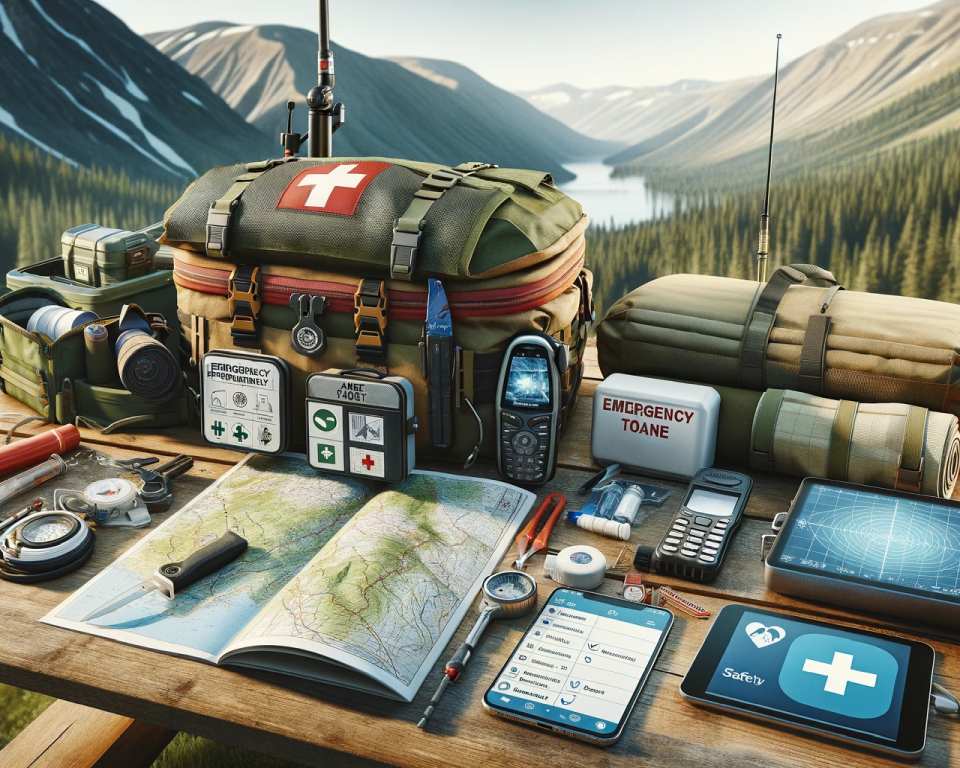
Flexibility and Adapting to Changing Conditions
Flexibility is key when it comes to camping during the COVID-19 pandemic. As we navigate these uncertain times, it’s essential for us to be prepared to adapt our camping plans based on changing conditions and guidelines. By staying flexible, we can ensure that we have an enjoyable outdoor adventure while prioritizing our safety and the safety of others.
One important aspect of flexibility is monitoring updates from national parks, campgrounds, and local authorities regarding any restrictions or closures. It’s crucial for us to stay informed about the latest guidelines and regulations in our chosen camping destinations. By doing so, we can make informed decisions and adjust our plans accordingly.
Having alternative camping options in mind is another valuable strategy for maintaining flexibility. If our initially planned destination becomes unavailable due to restrictions or closures, having backup options allows us to still enjoy our outdoor adventure. Researching nearby campgrounds or exploring lesser-known areas can offer exciting alternatives that provide a similar camping experience.
“Flexibility is not just about adapting our plans; it’s also about embracing new and unexpected opportunities. It’s about being open to change and finding joy in the unexpected.”
– Outdoor enthusiast
As we adapt to changing conditions, it’s important for us to remember that the primary goal is to prioritize our safety and the safety of others. Our ability to remain flexible and adapt our plans will contribute to a responsible camping experience during these challenging times.
Remember, flexibility is not just about adapting our plans; it’s also about embracing new and unexpected opportunities that come our way. By staying informed, having alternative options, and maintaining a positive mindset, we can navigate changing conditions and continue to enjoy the beauty of the great outdoors.
Stay flexible, stay safe, and embrace the adventure!
The Future of Car Camping in the Era of COVID-19
The COVID-19 pandemic has drastically impacted the outdoor industry, and car camping is no exception. As people seek safe and socially distant leisure activities, camping has experienced a surge in popularity. This increased interest in outdoor activities is likely to have long-term effects on camping trends, shaping the future of car camping.
Camping offers a unique opportunity to reconnect with nature and escape the confines of daily life, making it an appealing choice for those looking for a getaway post-COVID-19. The desire for outdoor adventure and the benefits of spending time in nature are driving factors behind the increased interest in camping.

Furthermore, the evolving safety protocols and guidelines have encouraged campgrounds and outdoor hospitality companies to adapt to meet the needs and expectations of travelers. From implementing enhanced cleaning procedures to providing contactless check-ins, these adaptations ensure that campers can enjoy their outdoor adventures while prioritizing safety.
As we move forward, it is anticipated that camping will remain a popular choice for individuals and families seeking a safe and enjoyable outdoor experience. With the continued focus on evolving safety protocols, the future of car camping looks promising post-COVID-19.
Conclusion
Car camping during the COVID-19 pandemic offers a unique opportunity to reconnect with nature while prioritizing the health and safety of ourselves and others. By adhering to responsible camping practices, we can ensure a safe and enjoyable outdoor adventure in these uncertain times. It is important to stay informed about the latest guidelines and restrictions, adapting our plans accordingly. Flexibility is key, and having alternative camping options in mind can help us navigate any changes or closures that may arise.
Responsible camping practices play a crucial role in minimizing our impact on the environment and maintaining the beauty of our natural spaces. Whether it’s practicing proper waste management through the “Leave No Trace” principles or respecting social distancing guidelines, we can enjoy the tranquility of the outdoors while preserving its integrity for future generations.
As the situation evolves, outdoor hospitality companies and campgrounds are working diligently to ensure the safety of their guests. By following their protocols and recommendations, we can confidently embark on our car camping trips, knowing that our health is being prioritized.
In conclusion, car camping allows us to enjoy the solace of nature while adhering to COVID-19 health protocols. By practicing responsible camping, adapting to changing conditions, and prioritizing safety, we can embark on a memorable and rejuvenating outdoor experience. Let us savor the beauty of the great outdoors while protecting the health and well-being of ourselves, our fellow campers, and the environment.
FAQ
What are some safe camping practices during the COVID-19 pandemic?
Safe camping practices during the COVID-19 pandemic include practicing good hygiene, maintaining social distancing, avoiding crowded areas, and following camping restrictions and guidelines.
Why is car camping popular during the COVID-19 pandemic?
Car camping is popular during the COVID-19 pandemic because it allows for social distancing, greater control over the environment, and the ability to enjoy nature while minimizing exposure to others.
What factors should I consider when planning a car camping trip during the COVID-19 pandemic?
When planning a car camping trip during the COVID-19 pandemic, it is important to consider factors such as following health guidelines, respecting camping restrictions, and practicing responsible camping practices.
How should I choose a campsite during the COVID-19 pandemic?
When choosing a campsite during the COVID-19 pandemic, it is important to consider factors such as privacy, amenities that prioritize hygiene and cleanliness, and packing essentials for a COVID-safe camping trip.
What campsite etiquette should I practice during the COVID-19 pandemic?
During the COVID-19 pandemic, campsite etiquette includes maintaining a safe distance from neighboring campsites, avoiding crowded areas, and following any guidelines set by the campground or national park regarding gatherings or group activities.
How can I ensure safety in shared facilities and amenities at campgrounds?
To ensure safety in shared facilities and amenities at campgrounds, follow any cleaning protocols in place, practice social distancing in common areas, and adhere to guidelines and restrictions set by the campground.
What are some food and cooking safety tips for camping during the COVID-19 pandemic?
Food and cooking safety tips for camping during the COVID-19 pandemic include practicing safe food handling, using separate utensils for raw and cooked foods, cooking food thoroughly, and minimizing shared food and containers.
How should I practice responsible waste management while camping?
Practice responsible waste management while camping by following the principles of “Leave No Trace,” which include packing out all trash, properly extinguishing campfires, disposing of waste in designated bins, and avoiding littering.
How can I be prepared for emergencies while camping during the COVID-19 pandemic?
Be prepared for emergencies while camping during the COVID-19 pandemic by having a well-stocked first aid kit, communication devices, and emergency contacts readily available. Know the location of the nearest medical facilities and emergency services.
How should I adapt my camping plans to changing conditions and guidelines?
To adapt camping plans to changing conditions and guidelines, stay informed about updates, monitor restrictions or closures, and have alternative camping options in mind.
What is the future of car camping in the era of COVID-19?
The future of car camping in the era of COVID-19 will likely be influenced by ongoing health concerns and shifting travel patterns. It is expected to remain popular as people seek safe and enjoyable outdoor adventures.
What are some final thoughts on car camping during the COVID-19 pandemic?
Final thoughts on car camping during the COVID-19 pandemic include the importance of responsible camping practices, prioritizing safety while enjoying nature, and adapting to new health protocols.

